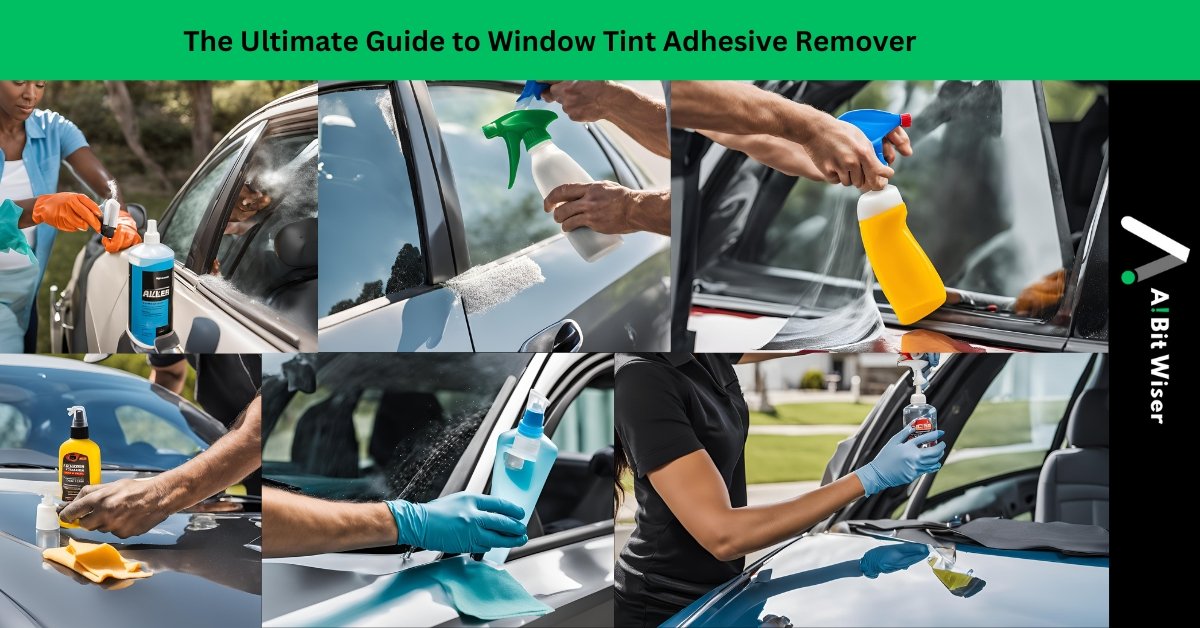The Ultimate Guide to Window Tint Adhesive Remover

Window Tint Adhesive Remover: Window tinting can improve the appearance and usefulness of the windows in your car or house, but removing the tint can be difficult due to the adhesive that is left behind.
Everything you need to know about window tint adhesive removers will be covered in this article, including their advantages, the top options available, and how-to use them step-by-step.
Understanding Window Tint Adhesive
What is Window Tint Adhesive?
The substance that is used to adhere tint film across glass surfaces is called window tint adhesive. It makes sure the tint keeps in place to feed a long time, but when you want to modify or eliminate the tint, it can be a pain. The adhesive may leave a tacky residue that draws dirt and grime, giving the glass an ugly appearance while also making cleaning it more challenging.
Why Remove Window Tint Adhesive?
Removing window tint adhesive is essential for several reasons:
- Aesthetic Appeal: Windows with leftover glue may appear messy and disorganised.
- Functionality: Remaining particles may obstruct light passing through the glass.
- Preparation for New Tint: A flawless application of fresh tint film requires clean glass.
Choosing the Right Window Tint Adhesive Remover
Types of Adhesive Removers
There are several types of adhesive removers available, each with its unique properties:
Chemical Solvents: The aforementioned are designed specifically to remove adhesive residue from surfaces. Acetone, isopropyl alcohol, and commercialised adhesive removers are examples of common solvents.
Natural Solvents: Eco-friendly and sometimes efficacious products include vinegar and citrus-based removers.
Mechanical Methods: To remove glue, use plastic scrapers and razor blades in combination with solvents.
Top Products on the Market
1. Goo Gone Automotive Spray Gel: Made especially for use in cars, this solution dissolves glue efficiently and doesn’t harm surfaces.
2. 3M General Purpose Adhesive Cleaner: A reputable name in the field, 3M provides an effective way to get rid of adhesive residues.
3. Citrus-based Adhesive Removers: Natural, mild, and efficient options are available from companies like De-Solv-it and Orange-Sol.
How to Use Window Tint Adhesive Remover
Preparation
Before starting the adhesive removal process, gather the necessary tools:
- Protective gloves
- Mask (for ventilation)
- Razor blade or plastic scraper
- Microfiber cloths
- Spray bottle (if using a liquid remover)
- Soapy water
Step-by-Step Removal Process
Step 1: Soften the Adhesive
Spray the adhesive remover: Douse the residue with a liberal amount of the adhesive remover. Ascertain adequate ventilation in the region before applying a chemical solvent.
Let it sit: Give the remover a few minutes to settle. The adhesive will get softer as a result, making removal simpler.
Step 2: Scrape Off the Adhesive
Use a razor blade or scraper: With a razor blade or scraper, carefully remove the adhesive that has weakened. In order to prevent scratching the surface of the window, hold the blade at a small slant. A plastic squeegee is safer when used on plastic surfaces.
Wipe with a cloth: In order to eliminate the sticky substance and remover residue, use a microfiber cloth while you scrape.
Step 3: Clean the Surface
Wash with soapy water: To get rid of any remaining leftover solvent and glue, wash the surface of the object with detergent and water.
Dry and polish: Use a fresh micro fibre cloth to dry and shine the glass.
Tips for Effective Removal
Test in a small area: To make sure the adhesive remover doesn’t harm the surface, always try it in a small, discrete area first.
Work in sections: To achieve better control and complete removal, work on tiny parts at a time.
Patience is key: Certain adhesives can be extremely difficult to remove, necessitating several applications and some elbow grease.
Safety Precautions
Handling Chemicals Safely
Wear protective gear: When handling solvents that are chemicals, always wear a face mask as well as gloves.
Ventilation: Verify that that you have adequate ventilation in the area to prevent fume inhalation.
Follow instructions: Follow the instruction manual provided by the manufacturer to ensure sound and effective use..
Eco-Friendly Alternatives
Natural removers: If you’d rather take a greener route, go for vinegar- or citrus-based treatments.
Proper disposal: To reduce your influence on the environment, dispose of chemical removers and dirty cloths in accordance with local laws.
Conclusion
The process of removing window tint glue doesn’t have to be difficult. You may create clean, residue-free windows that are ready for a fresh tint or an unobstructed view with the correct tools and techniques. A seamless and effective adhesive removal procedure can be achieved by following the instructions provided in this guide, regardless of whether you decide to use chemical solvents, natural substitutes, or a combination of the two.










